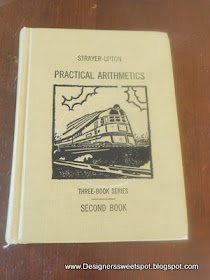My husband is a total math guy. He collects math books for fun, and for reference when he tutors math students. We have an entire shelf dedicated to various editions of Calculus, Statistics, Algebra 1 and 2, Geometry and of course basic math books. We have tried many math curricula over the years and very few of them have made it on to the "keeper" shelf. Our favorite pick for learning basic math skills remains the same. It's a little series of 3 hard cover books originally published in 1934 called Practical Arithmetic.
Each book is intended for approximately 2 years of study. The books are non-consumable and incredibly cost effective at only $13.95 each. Wow! Most math curricula today are in the neighborhood of $100.00 for each level alone! According to the publisher the books are intended for use beginning in the 3rd grade through 8th grade. The answer key is included in the back. There are also little tests along the way. If a child cannot pass the test, they are required to go back and do more practice problems.
The first book covers simple math concepts like reading and writing numbers, addition, subtraction, multiplication and division, measuring lengths, and liquids.
Each page contains many practice problems, far more than any other math program. Many of the problems are in story problem format which is excellent practice for all ages, although if your child is a struggling reader they may require help in this area.
We used a spiral notebook in which the kids were required to copy each problem and show their work. You can also use a single sheet of paper lined up under the columns of numbers and just have the children write the answers. Way back when, people used a chalk slate for calculation. This also might be fun. All are acceptable.
Practical Arithmetic: Second book covers fractions, comparing numbers, area, scale drawing, volume, decimals, graphs, bills, receipts, and percentages.
The Third book includes more percentages, electricity, gas, graphs, accounting, budgets, banking, geometry, compound interest, installment buying, stocks, insurance, taxes, equations, square roots and the metric system.
There are pluses and minuses to any program. We love these books for the amount of practice problems that they offer and the practical math application. Your child will have a SOLID understanding of the subject and will easily be able to move on to higher level mathematics. Our first child did very well with these books. Our dyslexic children struggled with them. The print is rather small, even harder to read for those struggling learners. Also, the number of story problems was difficult for our non-readers. Dyslexics have great difficulty doing copy work, and for a time I copied all the problems into notebooks for them, but long term this was not a practical method to teach them. Also, there are no manipulatives for this program, which for some children makes all the difference in being able to understand a concept.
Do you know someone, perhaps a relative or grandparent that constantly complains how young people can't do basic math? Do they complain that today, we are raising a generation of kids that use calculators in early grade school and are overly reliant on computers and technology? Or perhaps you have seen a young teen working at the grocery store that can't make change for a dollar? Back when our parents and grandparents were being raised they focused mainly on BASIC math concepts. This worked for generations of people with very little change. Why do we feel we can improve on this? In the 20 years my husband has been a math tutor, he is constantly amazed that the vast majority of his students are struggling because they are weak in basic math. If you are strong in the basics, upper level mathematics are much easier to learn.
You can purchase Practical Arthmetic








We've been using Ray's Arithmetic, which seems similar. No frills, but you come away with a great understanding and ability to solve problems in your head. I had not heard of these books before, so thank you for sharing them with us at Trivium Tuesdays last week!
ReplyDelete